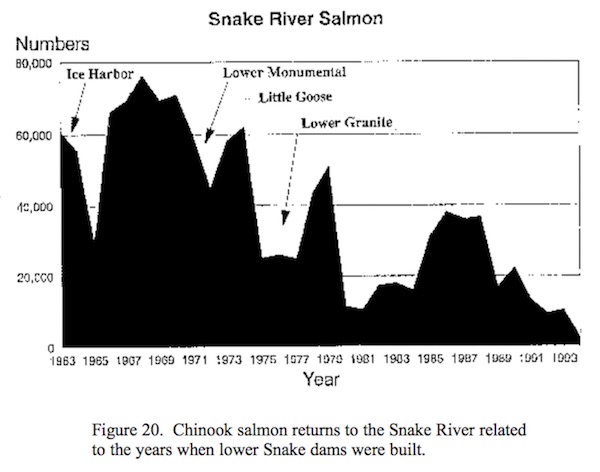forum
library
tutorial
contact

We Can Do Better
on Salmon Discussion
by Kurt Miller
San Juan Islander, January 3, 2021
|
the film forum library tutorial contact |

|
We Can Do Better
by Kurt Miller
|
 In a November 9 op-ed, Sharon Grace and Chris Pinney suggested that my organization was peddling "disinformation" about the effect of the lower Snake River dams on salmon populations. They also stated their belief that our press statement highlighting a study on ocean conditions was "disingenuous." Lastly, they called the study, itself, "pro-dam propaganda."
In a November 9 op-ed, Sharon Grace and Chris Pinney suggested that my organization was peddling "disinformation" about the effect of the lower Snake River dams on salmon populations. They also stated their belief that our press statement highlighting a study on ocean conditions was "disingenuous." Lastly, they called the study, itself, "pro-dam propaganda."
In response, I want to begin by saying that I respect the passion that Ms. Grace and Mr. Pinney have for salmon recovery. My organization, Northwest RiverPartners, primarily represents communities across the Pacific Northwest served by not-for-profit electric utilities, like the San Juan Islands. Accordingly, we work very hard to reflect the values of the communities we serve. These values include restoring healthy salmon populations, which is one of the four key pillars of our organizational mission.
The challenge with the salmon debate, unfortunately, is passion often overrides the ability to have civil discussions. My organization believes, however, the ability to have positive discourse is critical to finding solutions around salmon restoration and helping the region to realize its decarbonized future. This approach should include the ability to present new data, even if it conflicts with long-held assumptions.
In terms of the Kintama Research study that Ms. Grace and Mr. Pinney criticized as "flawed" and funded by the Bonneville Power Administration, it is important to clarify that BPA provides funding for the vast majority of salmon-related studies in the Pacific Northwest. BPA is the entity with the budget.
Secondly, the Kintama Research study was peer-reviewed and published in Fish and Fisheries. This accomplishment doesn't mean the study is without flaws, but it does verify the study meets a level of scientific rigor that other studies are not required to meet.
Thirdly, the crux of the Kintama Research findings -- that the cause of coastwide salmon declines likely resides somewhere in the ocean -- is not a unique conclusion. In 2019, the United Nations' Intergovernmental Panel on Climate Change released a major report indicating that changing ocean conditions caused by climate change represent the single largest risk to all marine fish.
This year, NOAA Fisheries concluded that if ocean temperatures continue to warm at their current pace, Chinook salmon may only have 20-30 years left in Northwest rivers.
Lisa Crozier, a respected NOAA scientist has said that scientists around the world are observing near-synchronous declines in salmon populations. These declines include even near-pristine rivers in Alaska.
The confusing part for many people is the timing. About the same time the last lower Snake River dam was completed, coincided with a decline in returning adult salmon to that river. However, that timing also coincides with the coastwide salmon survival declines noted in the Kintama Research study. It also coincides with the timing noted in a University of Alaska study indicating that the body size of adult salmon returning to Alaskan rivers has diminished.
The Kintama Research concludes that more science needs to be undertaken to understand the drivers of salmon survival declines. This recommendation isn't suspicious, but prudent. Using best practices now embraced in biomedical sciences -- binding, randomized double-blind experiments with explicit treatment and control groups -- we can test to see if dam passage is the limiting factor for salmon recovery.
We want to adopt measures that will drive salmon abundance without needlessly putting our region at risk from significantly higher electricity costs, potential blackouts, and higher levels of carbon and other emissions. The point is, we can't afford to "breach first and ask questions later." By continuing to scientifically question assumptions, we can do better.
learn more on topics covered in the film
see the video
read the script
learn the songs
discussion forum
